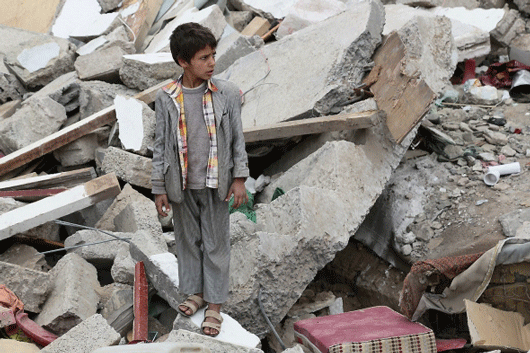
Local Editor
Tomorrow marks 500 days since the escalation of conflict in Yemen-a disastrous milestone for the millions of Yemeni civilians under attack, forced to flee their houses and pushed into further poverty. Right now, peace talks between the parties to the conflict are on the verge of collapsing once again, propelling the entire country into further disaster that will take decades to undo.
"The fate of Yemen lies in the hands of those who are meant to reach a peace agreement this weekend," said Norwegian Refugee Council Secretary General Jan Egeland. "They are directly responsible for the suffering they’ve created, and for putting an end to it. It is only through an inclusive peace agreement that this senseless cycle of violence can be broken. They have failed for the last 500 days, and time is running out before the catastrophe will be irreversible."
In the last 500 days
• more than 6,500 civilians were killed, 32,000 injured.
• eight out of every 10 Yemenis - or 21 million people - are in need of humanitarian aid.
• almost three million Yemenis fled their homes, and over 2 million remain displaced. Two thirds of internally displaced people have been displaced for 10 months or more.
• over 14 million Yemenis are unable to put enough food on the table, and more than half of them are classified as "severely food insecure".
• almost 20 million people do not have access to clean water.
• over 14 million Yemenis do not have access to healthcare.
• Saudi-imposed trade blockade has crippled Yemen’s already fragile economy, leading to massive inflation and price hikes
Raging conflict
"Despite the staggering figures of ordinary Yemenis suffering because of the raging conflict, the outside world has kept its eyes shut to this crisis," said NRC’s Country Director in Yemen, Syma Jamil. "The situation for Yemenis keeps deteriorating and it is now untenable. Yemenis won’t be able to cope for much longer."
Coupled with the violence, an ongoing air and naval trade blockade has destroyed the Yemeni economy, forcing more Yemenis than ever to dependency on humanitarian aid.
Amal Mahyoob, a widow and mother of a 13-year-old son from Lahij, is one of the millions forced to stay in their bombed out home. She lives in one of the governorates that are hardest hit by the fighting, but with nowhere to flee, she had to stay in the one room left standing and pray they would be spared. Her neighbor, Saddah Abdoh Al-Hajj, has returned to her partially destroyed house, having nowhere else to stay. The 55-year-old was hit by shrapnel during air strikes, injuring her leg permanently.
"I live in fear that my home will be hit by air strikes again," Saddah said.
Despite the desperate conditions, the response to the crisis in Yemen has been woefully low. Of an estimated US$1.8 billion needed for Yemen’s humanitarian response, only a quarter of the appeal has been funded so far, eight months into the year.
Source: News Agencies, Edited by Website Team